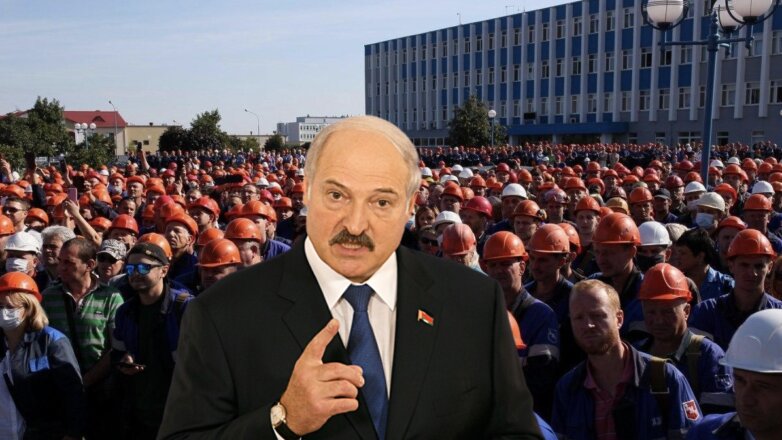The Belarusian regime has now effectively outlawed any protest activity and clamped down on its main threat: citizen journalists driving the decentralized protests ongoing since August.
On 24 May, self-proclaimed president Lukashenka signed a law on public events and the media, the state media BELTA reported. Changes will make it effectively impossible to continue the world's first "Telegram revolution," as the Belarusian uprising was termed for its decentralized nature driven by citizen journalist Telegram channels.
Particularly, the law imposes limits on what information can be spread by media. Media resources are now banned from sharing results of sociological polls on the political situation which were received without required accreditation. Hyperlinks to "prohibited" materials and messages are also banned.
The Prosecutor General's Office, regional and Minsk prosecutors are given the right to block Internet resources
that disseminate extremist propaganda and information deemed "harmful to the national interests of Belarus." This will lead to an effective blackout of any remaining protest actions, which have under the batons of the regime's siloviki dwindled from the hundred-thousand-strong rallies in Minsk to the occasional stroll of women donning white-red-white umbrellas and masks, to conceal their identity.
The Ministry of Information can also take down media resources, bypassing a court decision.
The law also clamps down on "foreign influence on the Belarusian information market," prohibiting medias from being founded by foreign legal persons and entities. It is expected this will take a toll on independent outlets such as RFE/RL.
Journalists can be stripped of accreditation for spreading fakes.
"Mass events" which include protests and rallies are now prohibited without official permission
from local authorities. Local authorities can also shut down the local infrastructure, such as public transport, in areas where mass events are being held. Leaders of political parties and organizations are prohibited from calling for participation in a rally before permission is obtained.
Crowdfunding to pay for the fines of protest organizers has been outlawed. This step is expected to cut off, among other things, the streams of support for supporters coming in from the Belarusian diaspora.
Livestreaming prohibited protests is also banned. Such livestreams were a known force of mobilizing protesters and letting them know that there are many of them.
Journalists performing their duties are prohibited from organizing or participating in mass events.
The law will come into effect one month after publication.
Its adoption happened amid an intensifying crackdown on civil society and the free press, one day after Belarus hijacked a plane in its airspace to arrest the founder of the country's largest opposition NEXTA Telegram channel, and six days after the country's largest independent news outlet Tut.by was taken down and its employees arrested.
Belarus takes down top news portal, arrests employees amid mounting assault on free press
Protests in Belarus are ongoing since August 2020, erupting after official data showed that dictator Alyaksandr Lukashenka had achieved a landslide victory in presidential elections amid reports of heavy falsification. However, this result appears to be "statistically impossible" even judging by official data. Moreover, a parallel vote count revealed that the likely winner of the election is Sviatlana Tsikhanouskaya, the only contender that Lukashenka did not jail.
Since then, the Lukashenka regime has expelled or jailed opposition leaders who were not yet behind bars. Tsikhanouskaya has been driven out of the country and has been meeting with international leaders, presenting herself as the leader of free Belarus. Security forces have cracked down on dozens of thousands of protesters and several have been killed. Some rights organizations claim there is credible proof of torture used against protesters.
Meanwhile, inside the country, Belarusian courts are arresting protesters and journalists one by one. Many protest participants have been driven into fleeing the country. Lukashenka denies any wrongdoing and dismisses claims of electoral falsification.
Read more:
- How Alyaksandr Lukashenka stole the Belarus presidential election
- Belarus takes down top news portal, arrests employees amid mounting assault on free press
- Lukashenka’s war against the free media
- Pillar of Lukashenka’s regime cracks as court journalists abandon ship
- Belarusian journalists on strike replaced by Russia’s RT strike-breaker
- “A blatant North Korea in the center of Europe.” Belarusian refugees explain why it’s so difficult to beat the dictatorship
- The lessons of Euromaidan: why the Belarusian revolution is at a stalemate
- Fear, horror, anger, despair, solidarity, apathy, and glee. 100 days of Belarus protests in photos
- Former Berkut riot police from Ukraine now dispersing anti-Lukashenka protests in Belarus
- Tsikhanouskaya says Belarusian opposition has “lost the streets” for now but won’t end the revolution





